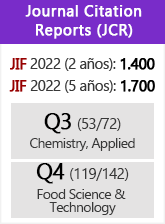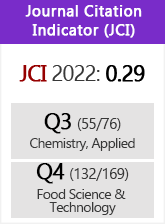Influencia de la temperatura en la oxidación de biodiesel de soja
DOI:
https://doi.org/10.3989/gya.0835142Palabras clave:
Biodiesel de soja, Cinética de oxidación, Productos de oxidación, Temperatura, TocoferolesResumen
El propósito de este trabajo es evaluar el efecto de la temperatura en el comportamiento oxidativo del biodiesel. Biodiesel derivado de aceite de soja fue oxidado a diferentes temperaturas (temperatura ambiente, 60 y 110 °C) y se evaluaron el contenido de compuestos primarios y secundarios de oxidación mediante el índice de peróxidos y de anisidina, respectivamente, a lo largo del periodo de inducción. Los resultados indicaron que el contenido de hidroperóxidos evolucionó siguiendo una cinética de orden cero a lo largo del periodo de inducción a todas las temperaturas y que su velocidad de formación cambió exponencialmente con la temperatura. También se dedujo que la temperatura influyó en la relación entre la formación de los productos de oxidación primarios y secundarios, disminuyendo a medida que aumentaba la temperatura. Además, fue posible predecir el comportamiento oxidativo del biodiesel de soja a temperatura ambiente ajustando a un modelo exponencial los valores de periodo de inducción obtenidos a diferentes temperaturas (70, 80, 90, 100 y 110 °C) mediante un equipo Rancimat.
Descargas
Citas
AOCS. 1997. American Oil Chemists' Society. Official methods and recommended practices of the AOCS. AOCS, Champaign.
ASTM. 2012. American Society for Testing and Materials. Method ASTM D7042 – Standard test method for dynamic viscosity and density of liquids by Stabinger viscosimeter (and calculation of kinematic viscosity). ASTM, West Conshohocken.
Aquino IP, Hernandez RPB, Chicoma DL, Pinto HPF, Aoki IV. 2012. Influence of light, temperature and metallic ions on biodiesel degradation and corrosiveness to copper and brass. Fuel 102, 795–807. http://dx.doi.org/10.1016/j.fuel.2012.06.011
Dantas MB, Albuquerque AR, Barros AK, Rodrigues Filho MG, Antoniosi Filho NR, Sinfrônio FSM, Rosenhaim R, Soledade LEB, Santos IMG, Souza AG. 2011. Evaluation of the oxidative stability of corn biodiesel. Fuel 90, 773–778. http://dx.doi.org/10.1016/j.fuel.2010.09.014
CEN. 2003a. European Committee for Standardization. Method EN 14105 – Determination of free and total glycerol and mono-, di-, triglyceride contents. CEN, Brussels.
CEN. 2003b. European Committee for Standardization. Method EN 14104 – Determination of acid value. CEN, Brussels.
CEN. 2003c. European Committee for Standardization. Method EN 14112 – Determination of oxidation stability. CEN, Brussels.
Fazal MA, Haseeb ASMA, Masjuki HH. 2010. Comparative corrosive characteristics of petroleum diesel and palm biodiesel for automotive materials. Fuel Process. Technol. 91, 1308–1315. http://dx.doi.org/10.1016/j.fuproc.2010.04.016
Frankel EN. 1984. Lipid oxidation: mechanisms, products and biological significance. J. Am. Oil Chem. Soc. 61, 1908–1917. http://dx.doi.org/10.1007/BF02540830
Fröhlich A, Schober S. 2007. The influence of tocopherols on the oxidation stability of methyl esters. J. Am. Oil Chem. Soc. 84, 579–585. http://dx.doi.org/10.1007/s11746-007-1075-z
Giordani DS, Siqueira AF, Silva MLCP, Oliveira PC, Castro HF. 2008. Identification of the biodiesel source using an electronic nose. Energy Fuels 22, 2743–2747. http://dx.doi.org/10.1021/ef700760b
Godoy AT, Pereira GG, Ferreira LL, Cunha IBS, Barrera- Arellano D, Daroda RJ, Eberlin MN, Alberici RM. 2013. Biodiesel oxidation monitored by ambient desorption/ionization mass spectrometry. Energy Fuels 27, 7455–7459. http://dx.doi.org/10.1021/ef4015422
Hoshino T, Iwata Y, Koseki H. 2007. Oxidation stability and risk evaluation of biodiesel. Therm. Sci. 11, 87–100. http://dx.doi.org/10.2298/TSCI0702087H
IUPAC. 1992. International Union of Pure and Applied Chemistry. Standard Methods for the Analysis of Oils, Fats and Derivates. 7. ed. International Union of Pure Applied Chemistry, Blackwell Scientific, Oxford.
Jain S, Sharma MP. 2010. Stability of biodiesel and its blends: a review. Renew. Sustain. Energy Rev. 14, 667–678. http://dx.doi.org/10.1016/j.rser.2009.10.011
Jain S, Sharma MP. 2011. Oxidation stability of blends of jatropha biodiesel with diesel. Fuel 90, 3014–3020. http://dx.doi.org/10.1016/j.fuel.2011.05.003
Knothe G, Dunn RO. 2003. Dependence of oil stability index of fatty compounds on their structure and concentration and presence of metals. J. Am. Oil Chem. Soc. 80, 1021–1026. http://dx.doi.org/10.1007/s11746-003-0814-x
Knothe G. 2007. Some aspects of biodiesel oxidative stability. Fuel Process. Technol. 88, 669–677. http://dx.doi.org/10.1016/j.fuproc.2007.01.005
Lacoste F, Lagardere L. 2003. Quality parameters evolution during biodiesel oxidation using rancimat test. Eur. J. Lipid. Sci. Technol. 105, 149–155. http://dx.doi.org/10.1002/ejlt.200390030
Maia ECR, Borsato D, Moreira I, Spacino KR, Rodrigues PRP, Gallina AL. 2011. Study of the biodiesel B100 oxidative stability in mixture with antioxidants. Fuel Process. Technol. 92, 1750–1755. http://dx.doi.org/10.1016/j.fuproc.2011.04.028
Márquez-Ruiz G, Martín-Polvillo M, Dobarganes C. 2003. Effect of temperature and addition of alpha-tocopherol on the oxidation of trilinolein model systems. Lipids 38, 233–40. http://dx.doi.org/10.1007/s11745-003-1056-2 PMid:12784863
McCormick RL, Ratcliff M, Moens L, Lawrence R. 2007. Several factors affecting the stability of biodiesel in standard accelerated tests. Fuel Process. Technol. 88, 651–657. http://dx.doi.org/10.1016/j.fuproc.2007.01.006
Monyem A, Van Gerpen JH. 2001. The effect of biodiesel oxidation on engine performance and emissions. Biomass Bioenergy 20, 317–325. http://dx.doi.org/10.1016/S0961-9534(00)00095-7
Nigam PS, Singh A. 2011. Production of liquid biofuels from renewable resources. Prog. Energy Combust. Sci. 37, 52–68. http://dx.doi.org/10.1016/j.pecs.2010.01.003
Pereira GG, Marmesat S, Barrera-Arellano D, Dobarganes MC. 2013. Evolution of oxidation in soybean oil and its biodiesel under the conditions of the oxidation stability test. Grasas Aceites 64, 482–488. http://dx.doi.org/10.3989/gya.036913
Sorate KA, Bhale PV. 2013. Impact of biodiesel on fuel system materials durability. J. Sci. Ind. Res. 72, 48–57.
Stoker HS. 2010. General, organic, and biological chemistry. Cengage Learning, Belmont.
Suarez PAZ. 2006. O biodiesel e a política de C & T brasileira. Quim. Nova 29, 1157–1157. http://dx.doi.org/10.1590/S0100-40422006000600001
Tomasevic AV, Siler-Marinkovic SS. 2003. Methanolysis of used frying oil. Fuel Process. Technol. 81, 1–6. http://dx.doi.org/10.1016/S0378-3820(02)00096-6
Publicado
Cómo citar
Número
Sección
Licencia
Derechos de autor 2015 Consejo Superior de Investigaciones Científicas (CSIC)

Esta obra está bajo una licencia internacional Creative Commons Atribución 4.0.
© CSIC. Los originales publicados en las ediciones impresa y electrónica de esta Revista son propiedad del Consejo Superior de Investigaciones Científicas, siendo necesario citar la procedencia en cualquier reproducción parcial o total.Salvo indicación contraria, todos los contenidos de la edición electrónica se distribuyen bajo una licencia de uso y distribución “Creative Commons Reconocimiento 4.0 Internacional ” (CC BY 4.0). Puede consultar desde aquí la versión informativa y el texto legal de la licencia. Esta circunstancia ha de hacerse constar expresamente de esta forma cuando sea necesario.
No se autoriza el depósito en repositorios, páginas web personales o similares de cualquier otra versión distinta a la publicada por el editor.
















